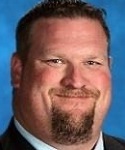
Crowley, Lintner & Smelis Named 2022 Bush Award Recipients
By
Geoff Kimmerly
MHSAA.com senior editor
August 11, 2022
Lowell’s Deanne Crowley, Owosso’s Dallas Lintner and Fenton’s Mitch Smelis all have provided more than two decades of service to Michigan educational athletics, Crowley as a highly-regarded coach and administrator, Lintner also as an administrator and educational leader and Smelis as an athletic trainer and prominent voice in the sports medicine community especially in its service to school sports.
To recognize their significant and continued contributions to educational athletics, Crowley, Lintner and Smelis have been named recipients of the Michigan High School Athletic Association’s Allen W. Bush Award for 2022.
Al Bush served as executive director of the MHSAA for 10 years. The award honors individuals for past and continuing service to school athletics as a coach, administrator, official, trainer, doctor or member of the media. The award was developed to bring recognition to people who are giving and serving without a lot of attention. This is the 31st year of the award, with selections made by the MHSAA's Representative Council.
Crowley began her coaching career at Lake Odessa Lakewood in 1987 with subvarsity basketball, and she took over Lowell’s girls varsity program in 2000 after previously beginning her teaching career there in 1998. She remained the Red Arrows’ coach through 2006, that season leading her team to the Class A Semifinals – and she also was named Class A Coach of Year in 2004 by The Associated Press. Crowley became an assistant principal at Lowell in 2010 and the high school’s athletic director in 2013.
 She earned her certified athletic administrator designation from the National Interscholastic Athletic Administrators Association (NIAAA) in 2018 and was named Region 4 Athletic Director of the Year this past school year by the Michigan Interscholastic Athletic Administrators Association (MIAAA). Previously, she was named Athletic Director of the Year by the Michigan Wrestling Association for the 2018-19 school year and by the West Michigan Officials Association in 2021. Crowley also is a significant contributor to Lowell’s nationally-recognized Pink Arrow Pride program that raises funds annually for cancer awareness, education and support within the Lowell community; she organizes and coordinates the education program, which among other goals provides scholarships for Lowell graduates pursuing careers in medicine. She also was a co-founder in 2000 of the Lady Arrows Varsity Club, which provides leadership training for female student-athletes who have earned a varsity letter.
She earned her certified athletic administrator designation from the National Interscholastic Athletic Administrators Association (NIAAA) in 2018 and was named Region 4 Athletic Director of the Year this past school year by the Michigan Interscholastic Athletic Administrators Association (MIAAA). Previously, she was named Athletic Director of the Year by the Michigan Wrestling Association for the 2018-19 school year and by the West Michigan Officials Association in 2021. Crowley also is a significant contributor to Lowell’s nationally-recognized Pink Arrow Pride program that raises funds annually for cancer awareness, education and support within the Lowell community; she organizes and coordinates the education program, which among other goals provides scholarships for Lowell graduates pursuing careers in medicine. She also was a co-founder in 2000 of the Lady Arrows Varsity Club, which provides leadership training for female student-athletes who have earned a varsity letter.
Crowley graduated from Lakewood High School in 1983 and earned her bachelor’s degree in secondary education from Western Michigan University in 1997 and a master’s in educational administration from Michigan State University in 2002.
“I have known Dee for over 20 years, and she has always been incredibly dedicated to finding opportunities for all students, especially female student-athletes,” Uyl said. “Her years as a coach and administrator have shown a solid record of finding ways for kids to compete.”
Lintner is returning to Owosso High School as principal this fall after finishing the second half of 2021-22 as interim athletic director at Fenton High School. He first joined the staff at Owosso as a teacher in 2001-02, went to Linden as athletic director for two years beginning with fall of 2008, then returned to Owosso as athletic director and assistant principal from 2010 through the 2020-21 school year. He served as principal at Owosso Lincoln High School last school year until leaving for Fenton.
 Education has been a focus of Lintner’s work, and he received a doctorate in educational leadership from University of Michigan-Flint in 2017. He has a certified master athletic administrator designation and has served as a leadership training instructor for the NIAAA since 2015. He also has served as a facilitator for the Love and Logic parenting program.
Education has been a focus of Lintner’s work, and he received a doctorate in educational leadership from University of Michigan-Flint in 2017. He has a certified master athletic administrator designation and has served as a leadership training instructor for the NIAAA since 2015. He also has served as a facilitator for the Love and Logic parenting program.
Lintner has been an active participant with the MIAAA as well, serving as its constitution committee chairperson since 2009. He was a member of the executive board from 2015-20, including serving as president during the 2018-19 school year. As athletic director, he was a frequent host of MHSAA postseason events and a contributor to various committees, and he previously was an MHSAA registered official for track & field and coach in multiple sports. Prior to earning his doctorate, Lintner graduated from Vassar High School in 1995, then earned a bachelor's degree in education from Saginaw Valley State University in 2000 and a master’s in athletic administration from Central Michigan University in 2005.
“Dallas has provided years of solid leadership in Owosso,” MHSAA Executive Director Mark Uyl said. “This consistent approach has led to numerous improvements, and during his tenure as athletic director his school won its first state championship, with the softball program (in 2021).”
Smelis has served as an athletic trainer for 25 years with Fenton Area Public Schools, for the last decade through NovaCare Rehabilitation. He was named High School Athletic Trainer of the Year by the Michigan Athletic Trainers’ Society (MATS) in 2017 and serves as co-chairperson of its Secondary School Committee.
 Also a member of the National Athletic Trainers Association (NATA) and Great Lakes Athletic Trainers Association (GLATA), Smelis has become a key connection between the training community and MHSAA. He has contributed as a MATS liaison on multiple MHSAA sport committees, and serves on the Sports Medicine Advisory Committee and as an instructor for the MHSAA’s Coaches Advancement Program (CAP). He also has presented at the MIAAA’s annual and summer conferences on a variety of physical health and safety and mental health topics.
Also a member of the National Athletic Trainers Association (NATA) and Great Lakes Athletic Trainers Association (GLATA), Smelis has become a key connection between the training community and MHSAA. He has contributed as a MATS liaison on multiple MHSAA sport committees, and serves on the Sports Medicine Advisory Committee and as an instructor for the MHSAA’s Coaches Advancement Program (CAP). He also has presented at the MIAAA’s annual and summer conferences on a variety of physical health and safety and mental health topics.
Smelis graduated from Imlay City High School in 1991 and earned a bachelor’s degree in sports medicine from Central Michigan University in 1997. He is a certified American Heart Association instructor for CPR, first aid and basic life support and has served as lead instructor in CPR and first aid for Fenton’s coaches and staff.
“Mitch has been incredibly dedicated to keeping kids safe while playing all sports,” Uyl said. “He also has been responsible for further strengthening the good relationship between the MHSAA and Michigan Athletic Trainers’ Society, and he continues to provide valuable insight as part of our coaches education efforts.”

Rep Council Considers Several Topics During Fall Meeting for 2023-24 Work
By
Geoff Kimmerly
MHSAA.com senior editor
December 7, 2023
The Representative Council of the Michigan High School Athletic Association began examining several topics during its Fall Meeting, Dec. 1 in East Lansing – including start and end dates of the winter calendar, possible new transfer rule exceptions and emerging sports – that will shape its work during the winter and spring meetings of this 2023-24 school year.
Generally, the Council takes only a few actions during its Fall Meeting, with topics often introduced for additional consideration and action during its meetings in March and May. The Council did take three actions this time as part of larger conversations expected to continue over the next six months.
The Council joined staff discussion on the start and end dates of winter seasons and the possibility of moving up both, which was among topics surveyed as part of the Update Meeting poll completed by administrators during the MHSAA’s annual presentations across the state this fall. Staff will prepare a recommendation for Council to review at a future meeting regarding the 2025-26 school year and beyond.
MHSAA staff also provided a variety of transfer rule issues encountered over the last year, and Council discussed the possibility of adding transfer rule exceptions related to military transfer families, fulltime school employee transfers and students returning from a sports academy or prep school and seeking immediate eligibility. The Council did adopt a change for multi-high school districts (with at least three high schools) that include both boundary and non-boundary schools that more clearly defined where students at those schools have immediate eligibility.
The Council also discussed possible new and emerging sports, including proposals for MHSAA sponsorship received by the water polo and field hockey governing bodies and an anticipated proposal to add boys volleyball to the MHSAA Tournament lineup.
Several more conversations regarded MHSAA postseasons:
- The Council reviewed the work of the Football Task Force and considered a staff recommendation to have the Football Committee in January discuss possibly capping enrollment of Division 8 11-player schools at 250 students to incentivize schools within that group to play 11-player instead of switching to 8-player.
- MHSAA staff have identified four areas requiring financial increases – MHSAA Tournament officials fees, host schools compensations, manager honorariums and team reimbursements for Finals participants – and the Council discussed the importance of including these when the MHSAA Audit & Finance Committee meets in February to begin the 2024-25 budgetary process.
- The Council also discussed recommendations from the MHSAA Sports Medicine Advisory Committee addressing possible requirements of emergency action plans and AEDs at MHSAA Tournament sites.
The Fall Meeting saw the appointment of Wyoming Godfrey-Lee Schools superintendent Arnetta Thompson and Freeland Middle School principal Jennifer Thunberg to two-year terms to the 19-person Council, the first terms for both. The Council also reelected Scott Grimes, superintendent for Grand Haven Area Public Schools, as its president; Brighton High School athletic director John Thompson as its vice president, and Vic Michaels, director of physical education and athletics for the Archdiocese of Detroit, as secretary-treasurer.
The Representative Council is the legislative body of the MHSAA. All but five members are elected by member schools. Four members are appointed by the Council to facilitate representation of females and minorities, and the 19th position is occupied by the Superintendent of Public Instruction or designee.
The MHSAA is a private, not-for-profit corporation of voluntary membership by more than 1,500 public and private senior high schools and junior high/middle schools which exists to develop common rules for athletic eligibility and competition. No government funds or tax dollars support the MHSAA, which was the first such association nationally to not accept membership dues or tournament entry fees from schools. Member schools which enforce these rules are permitted to participate in MHSAA tournaments, which attract more than 1.4 million spectators each year.

